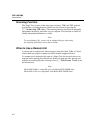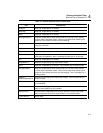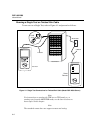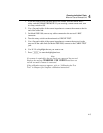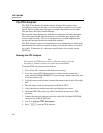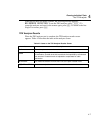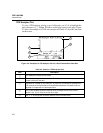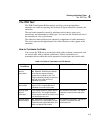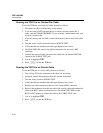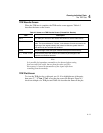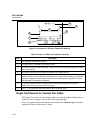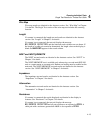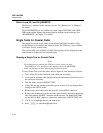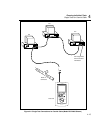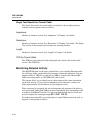
Running Individual Tests
The TDR Test
4
4-9
The TDR Test
The TDR (Time Domain Reflectometry) test helps you locate impedance
anomalies on a cable by reporting the locations of signal reflections caused by the
anomalies.
The test locates anomalies caused by problems such as shorts, opens, poor
connections, and mismatches in cable types. You can view the location and size of
the anomalies in a list or plot format.
The reflection values displayed are adjusted to compensate for cable attenuation.
The values represent the approximate size of the reflections as they appear at the
anomalies.
How to Terminate the Cable
You can run the TDR test on twisted pair cable with or without a remote unit, and
on coaxial cable with or without a terminator. Table 4-4 describes how
termination devices affect the results reported for twisted pair and coaxial cable.
Table 4-4. Effects of Termination on TDR Results
Cable Type and
Termination
Listed Results Show the Following: Plotted Results Show the Following:
Twisted pair
with no
termination
Displays the message
No Remote Detected. Results
show the two largest reflections
greater than or equal to 15%. The
largest reflection probably comes from
the end of the cable, but is not
identified as the end.
All reflections are shown.
Twisted pair
with remote
Two largest reflections greater than or
equal to 15%. Largest reflection is
identified as the end of the cable.
All reflections are shown.
Coaxial cable
with no
terminator
Two largest reflections greater than or
equal to 10%. The largest reflection
comes from the end of the cable, but is
not identified as the end.
All reflections are shown. The largest
reflection comes from the end of the
cable.
Coaxial Cable
with terminator
No Reflection reported for a
good cable. On a faulty cable, the test
reports the two largest reflections, but
does not identify end of cable.
All reflections are shown. The plot will
not show a reflection from the
terminated end.




